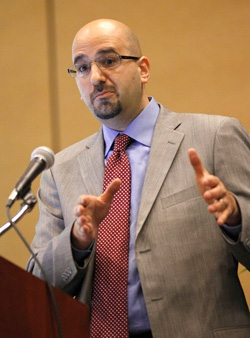Are those eggs really cruelty free? Food labeling scams open up opportunities for litigation

Amir Nassihi speaks during the panel.
Photo by Tony Avelar.
Concerned about whether you’re getting what you’re paying for with animal products advertised as natural and treated with “care”? You can change the world through your purchasing by demanding foods produced by humanely treated animals, says Carter Dillard, director of litigation for the Animal Legal Defense Fund in California.
But to do that, he tells attendees of the ABA Annual Meeting in San Francisco, “We need to know the truth about the background of the products we are buying, especially when the products are animals.”
And to get to the truth, Dillard says, you have to get beyond the untruths in false advertising, such as claiming eggs are certified as products of hens treated with “care” when the animals have been severely mistreated.
Dillard spoke at a session called “Do You Really Know What You Are Eating? Contemporary Issues You Should Know About in Food Labeling, Advertising and Fraud,” sponsored by the ABA’s Tort Trial and Insurance Practice Section. He sues over false ads, which he says is now a “massive area of law”–administrative, state and federal.
He is one reason California, particularly the U.S. Northern District of California, has become the leading litigation venue for such cases. Bruce A. Wagman from Schiff Hardin has a nationwide litigation practice that seeks to change how producers treat livestock and to stop certain practices industry-wide. Most states have anti-cruelty laws which, according to Wagman, often go unenforced–but which he can wield in court.
But sometimes not. Wagman explains what happened in a failed lawsuit alleging a false ad campaign with bucolic graphics showing “Happy Cows” in green fields and on grassy hillsides. In fact, the cows never saw or stepped on grass, but stood in mud during winter and on dry dirt in the summers. The ads were produced by the California Milk Advisory Board, a dues-paying industry group formed under the aegis of the state Department of Food and Agriculture.
The court said there was no doubt there was misrepresentation in the ads, “but in a quirk of law the court said a government agency like this board, though being an industry group, could not be sued by consumers.”
Just the same, litigation against food producers for ads and mislabeling has skyrocketed in recent years.
“’Welcome to the Food Court,’” panelist Amir Nassihi read aloud, holding up a headline from The Recorder, a legal newspaper.
“California has rapidly become the favorite venue for food litigation,” says Nassihi, an associate in the San Francisco office of Shook, Hardy & Bacon, a nationwide firm involved all manner of product liability defense. The Northern District federal court has the most food-labeling cases in the country, he added.
The reason, he says: California has some of the broadest consumer protection laws in the country.
Thus the state has drawn regular visits by a “small consortium of plaintiffs firms joined together, mostly from the East Coast, Chicago, New York, Mississippi, Tennessee and Florida, leading the charge with assistance from some California firms,” Nassihi says. They previously had toiled in litigation over asbestos and tobacco, which have declined, and in various areas with class actions, which have been stymied.
“So a lot of these lawyers have rebranded as food litigation lawyers,” says Nassihi, who has done a lot of work in drug and device litigation, noting that the same thing has happened within the defense bar. “That’s why I’m here.”
Apparently the criminal defense bar might also get a boost. Assistant U.S. Attorney Andrew Boutros, who has developed a food-law prosecution specialty in Chicago, explained how the intersection of food fraud and customs fraud is increasing the likelihood that criminal charges might apply.
This includes counterfeit food, such as soybean oil colored with chlorophyll and sold as olive oil, or honey imported as apple juice to avoid high tariffs.
Boutros, who emphasized that he was speaking for himself and not the government, offered one bit of bottom line advice: “Buy fresh tuna.”



